
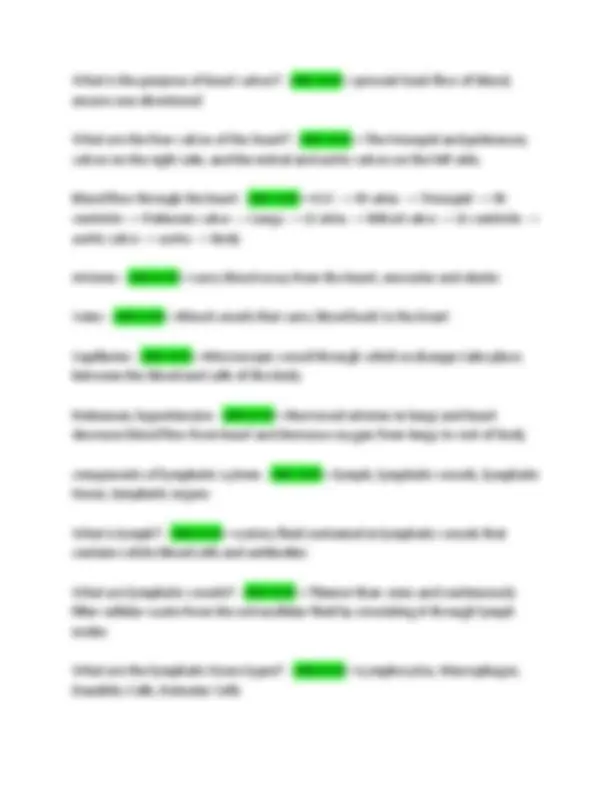
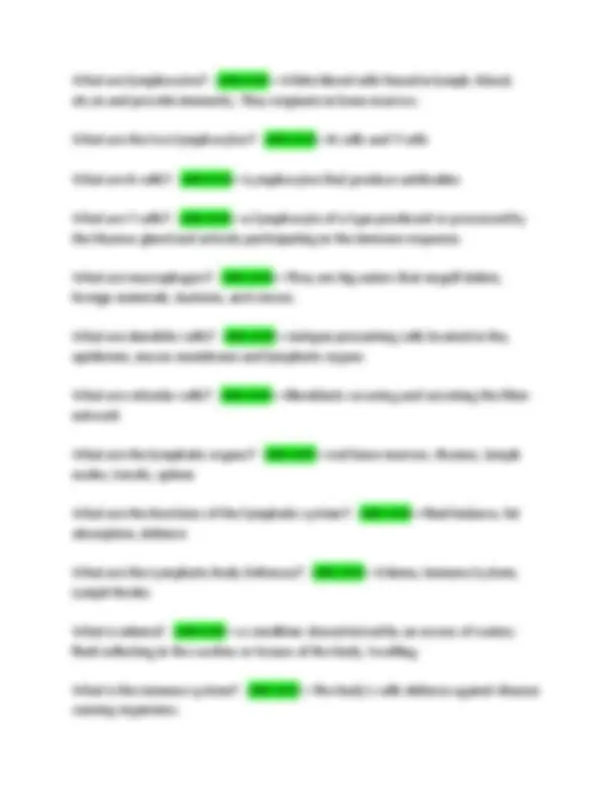
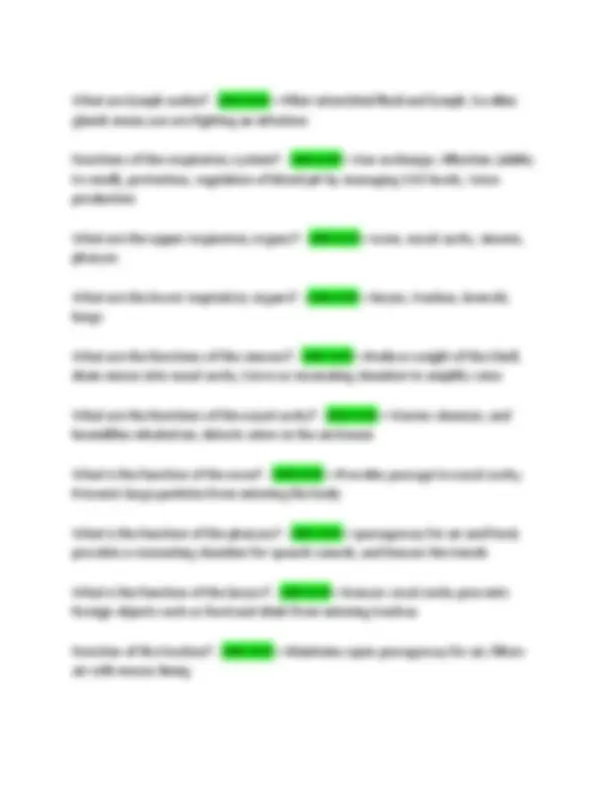
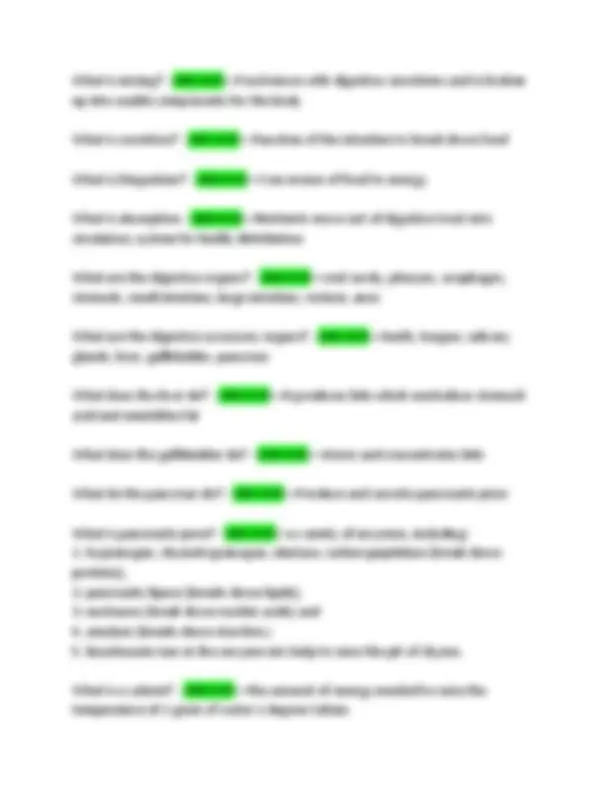
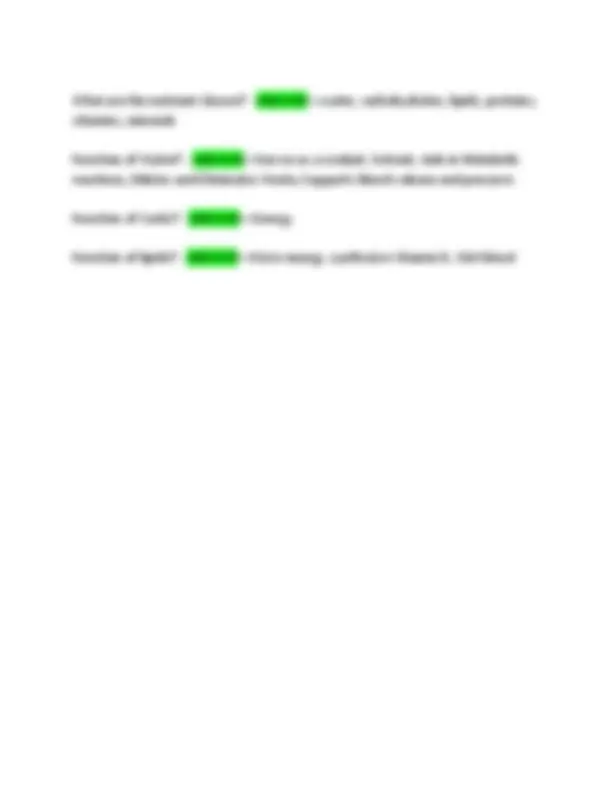


Study with the several resources on Docsity

Earn points by helping other students or get them with a premium plan


Prepare for your exams
Study with the several resources on Docsity

Earn points to download
Earn points by helping other students or get them with a premium plan
Community
Ask the community for help and clear up your study doubts
Discover the best universities in your country according to Docsity users
Free resources
Download our free guides on studying techniques, anxiety management strategies, and thesis advice from Docsity tutors
BIO202 Final Exam Study Guide Exam Questions With Well Detailed Answers
Typology: Exams
1 / 9

This page cannot be seen from the preview
Don't miss anything!






Viscosity of Blood? - ANSWER>>twice as thick as water
How long does it take for a drop of blood to circulate through the entire system? - ANSWER>>20-60 seconds
What is the composition of Blood - ANSWER>>55% plasma, 45% formed elements,
What are the fucntions of blood? - ANSWER>>-Moves regulatory and processed molecules, gasses, waste, and nutrients -Regulats pH and osmosis process -Maintain body temperature -Protect against foreign substances -Assist in clotting
What is the composition of plasma? - ANSWER>>91% water 7% proteins 2% other solutes
What proteins are found in blood plasma? - ANSWER>>albumin, globulins, fibrinogen
What solutes are found in blood plasma? - ANSWER>>Ions, nutrients, waste products, gasses, regulatory substances
What are two blood disorders - ANSWER>>Anemia and sickle-cell disease
What is sickle-cell disease? - ANSWER>>an abnormal red blood cell that has a crescent shape and an abnormal form of hemoglobin
What is anemia? - ANSWER>>a decrease in the oxygen-carrying ability of the blood
How much blood does the heart pump per minute? - ANSWER>>~5 1/4 Quarts per minute
What are action potentials? - ANSWER>>Sequence of electrical changes when a nerve membrane receives a stimulus that exceeds a threshold
What is depolarization? - ANSWER>>Loss of an electrical charge on the surface of a membrane
What is Repolarization? - ANSWER>>Gain of electrical charge on the surface of a membrane
What are the functions of the heart? - ANSWER>>generating blood pressure, routing blood, ensuring one-way blood flow, regulating blood supply
What are the two divisions of the heart? - ANSWER>>Pulmonary Circuit and Systemic Circuit
What are the components of the heart? - ANSWER>>Pericardium, Heart Wall, Chambers, Valves
What is the pericardium? - ANSWER>>Double-walled sac that surrounds the heart and reduces friction between pericardial membranes
What is the heart wall? - ANSWER>>Three protective layers of tissue
What to chambers of the heart do? - ANSWER>>Receive and return blood from and to the body
What are lymphocytes? - ANSWER>>White blood cells found in lymph, blood, etc.m and provide immunity. They originate in bone marrow.
What are the two lymphocytes? - ANSWER>>B cells and T cells
What are B cells? - ANSWER>>Lymphocytes that produce antibodies
What are T cells? - ANSWER>>a lymphocyte of a type produced or processed by the thymus gland and actively participating in the immune response.
What are macrophages? - ANSWER>>They are big eaters that engulf debris, foreign materials, bacteria, and viruses.
What are dendritic cells? - ANSWER>>Antigen presenting cells located in the, epidermis, mucus membrane and lymphatic organs
What are reticular cells? - ANSWER>>fibroblasts covering and secreting the fiber network
What are the lymphatic organs? - ANSWER>>red bone marrow, thymus, lymph nodes, tonsils, spleen
What are the functions of the lymphatic system? - ANSWER>>fluid balance, fat absorption, defense
What are the Lymphatic Body Defenses? - ANSWER>>Edema, Immune System, Lymph Nodes
What is edema? - ANSWER>>a condition characterized by an excess of watery fluid collecting in the cavities or tissues of the body. Swelling.
What is the immune system? - ANSWER>>The body's cells defense against disease causing organisms.
What are lymph nodes? - ANSWER>>Filter interstitial fluid and lymph. Swollen glands mean you are fighting an infection
Functions of the respiratory system? - ANSWER>>Gas exchange, Olfaction (ability to smell), protection, regulation of blood pH by managing CO2 levels, Voice production
What are the upper respiratory organs? - ANSWER>>nose, nasal cavity, sinuses, pharynx
What are the lower respiratory organs? - ANSWER>>larynx, trachea, bronchi, lungs
What are the functions of the sinuses? - ANSWER>>Reduce weight of the Skull, drain mucus into nasal cavity, Serve as resonating chamber to amplify voice
What are the functions of the nasal cavity? - ANSWER>>Warms cleanses, and humidifies inhaled air; detects odors in the airstream
What is the function of the nose? - ANSWER>>Provides passage to nasal cavity; Prevents large particles from entering the body
What is the function of the pharynx? - ANSWER>>passageway for air and food, provides a resonating chamber for speech sounds, and houses the tonsils
What is the function of the larynx? - ANSWER>>houses vocal cords; prevents foreign objects such as food and drink from entering trachea
Function of the trachea? - ANSWER>>Maintains open passageway for air, filters air with mucus lining
What is Lung Cancer? - ANSWER>>uncontrolled cell division in the lungs that is often caused by smoking and can lead to death
What is Pneumonia? Its treatment? - ANSWER>>Lower respiratory tract infection causing alveoli to fill with dead WBCs. Treatment is Rest, fluids, and aspirin.
What is Strep Throat? Treatment? - ANSWER>>Bacterial inflamed pharynx associated with pain. Treatment is antibiotics.
What is tuberculosis? Treatment? - ANSWER>>Bacteria invaded lungs that create tubercle structures impeding respiration. Treatment is antibiotics.
What are the digestive controls? - ANSWER>>Mechanical Digestion, Chemical Digestion, Digestion Enzymes
What are the four major digestive enzyme categories? - ANSWER>>Salivary, Gastric, Pancreatic, Intestinal
Functions of Salivary Enzymes? - ANSWER>>Break down starch and glycogen into dissacharides
Functions of Gastric Enzymes? - ANSWER>>Break down proteins and butter fats
What are the digestive proceses? - ANSWER>>Ingestion, Mastication, Propulsion, Mixing, Secretion, Digestion, Absorption
What is ingestion? - ANSWER>>taking food into the mouth
What is mastication? - ANSWER>>chewing food
What is propulsion? - ANSWER>>swallowing and peristalsis
What is mixing? - ANSWER>>Food mixes with digestive secretions and is broken up into usable components for the body
What is secretion? - ANSWER>>Function of the intestine to break down food
What is Diegestion? - ANSWER>>Conversion of food to energy
What is absorption - ANSWER>>Nutrients move out of digestive tract into circulatory system for bodily distribution
What are the digestive organs? - ANSWER>>oral cavity, pharynx, esophagus, stomach, small intestine, large intestine, rectum, anus
What are the digestive accessory organs? - ANSWER>>teeth, tongue, salivary glands, liver, gallbladder, pancreas
What does the liver do? - ANSWER>>It produces bile which neutralises stomach acid and emulsifies fat
What does the gallbladder do? - ANSWER>>stores and concentrates bile
What do the pancreas do? - ANSWER>>Produce and secrete pancreatic juice
What is pancreatic juice? - ANSWER>>a variety of enzymes, including:
What is a calorie? - ANSWER>>the amount of energy needed to raise the temperature of 1 gram of water 1 degree Celsius